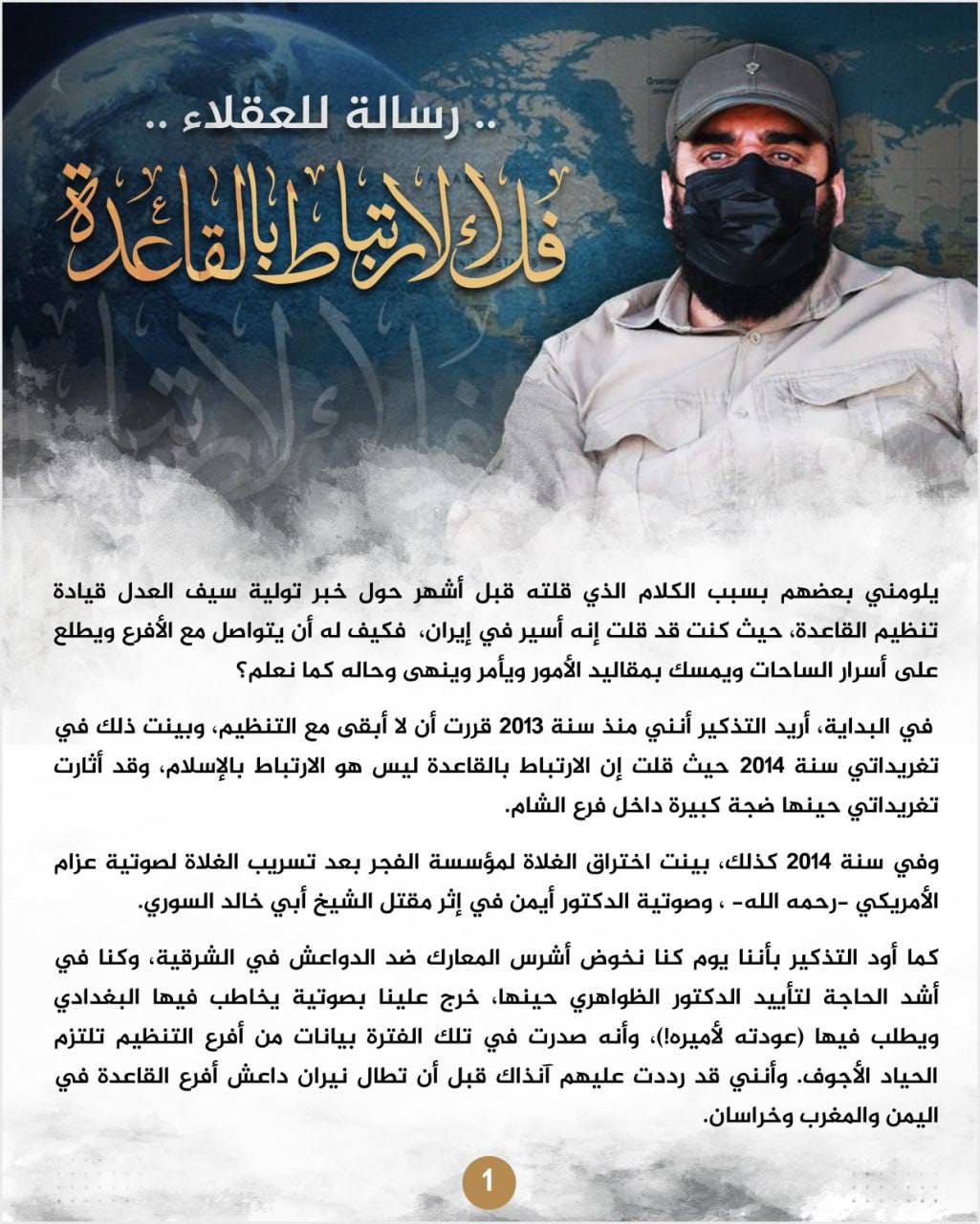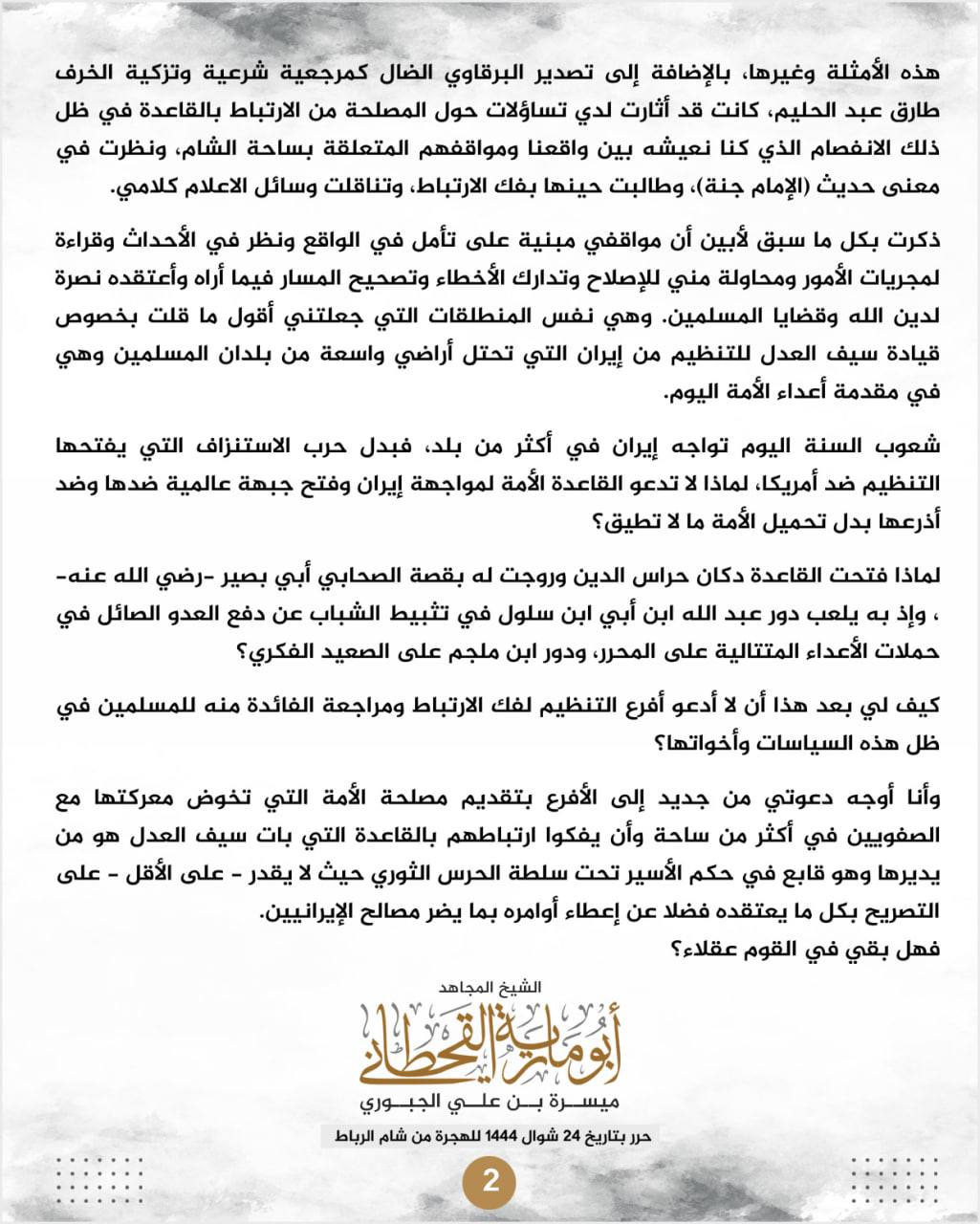Hay'at Tahrir al-Sham's Abu Mariya al-Qahtani on Breaking Ties with al-Qa'ida
Besides the original parting of ways between al-Qa‘ida and the Islamic State, arguably the most prominent fissure within the jihadist world over the past decade has been Hay’at Tahrir al-Sham’s split from al-Qa‘ida. To recap, Hay’at Tahrir al-Sham’s original core was Jabhat al-Nusra, which started out as an affiliate of the Islamic State of Iraq (ISI) and then declared a ‘renewal’ of a supposed allegiance to al-Qa‘ida leader Ayman al-Zawahiri in April 2013 when ISI declared its expansion into Syria and became Islamic State in Iraq and al-Sham.
In 2016, Jabhat al-Nusra rebranded as Jabhat Fath al-Sham, which ostensibly had no link to any ‘external’ entity but was intended to maintain a secret allegiance to Zawahiri until the latter should give his blessing for a larger merger with other insurgent factions that could lead to a breaking of ties out of interest for the jihad in Syria. Zawahiri however rejected the idea of secret allegiance, and once Jabhat Fath al-Sham became Hay’at Tahrir al-Sham in January 2017 (a move done without Zawahiri’s consultation or approval), the breaking of ties became complete.
Abu Mariya al-Qahtani- of Iraqi origin- is a leading figure in Hay’at Tahrir al-Sham and a key intellectual defender of the project (disclosure: I have corresponded with Abu Mariya and find him to be an intriguing and intelligent thinker, as we primarily discussed the situation in Iraq and its recent history). Not only does he defend the group’s breaking of ties with al-Qa‘ida, but he also calls on the existing branches of the organisation to break ties with it and redirect their priorities: that is, instead of considering the United States to be the primary enemy against whom efforts of a futile war of attrition should be directed, they should rather focus on combating Iran (‘the Safavids’) and its influence in the various countries in the Muslim world. A shift of focus towards Iran makes ties with al-Qa‘ida untenable, since its purported new leader since Zawahiri’s reported death in an American strike in Afghanistan last summer is Sayf al-‘Adel, who is currently said to reside in Iran. Previously also, it should be noted that Abu Mariya has called for the dissolution of al-Qa‘ida.
Of interest in Abu Mariya’s short article is his use of multiple historical reference narratives, most notably in his criticism of the Syria-based al-Qa‘ida-loyalist group Hurras al-Din that Hay’at Tahrir al-Sham has cracked down on since summer 2020 when Hurras formed an independent operations room that Hay’at Tahrir al-Sham perceived to be a threat to its own authority. He says that al-Qa‘ida promoted Hurras as though it were like Abu Basir and his guerrilla group, but in reality its role practically has been that of ‘Abd Allah bin Ubayy ibn Salul and that of Ibn Muljam on the level of thought.
Abu Basir, for context, was a Muslim who came from Mecca to Medina after the Treaty of Hudaybiyyah between the Muslims and the pagan Quraysh dated to 628 CE. Per the requirements of the treaty, Muhammad was obliged to return Abu Basir to the Quraysh, but instead Abu Basir escaped from custody and fled to the coastal area, forming a guerrilla gang attacking the Quraysh, who were so exasperated by the attacks that they asked Muhammad to take Abu Basir and his group without having to return them to Quraysh. Abu Basir’s example is thus seen as a case of how persistent guerrilla warfare can extract concessions from the enemy.
Conversely, ‘Abd Allah bin Ubayy ibn Salul was a supposed leader of the ‘hypocrites’ in Medina: that is, people outwardly professing Islam but inwardly harbouring disbelief. Ibn Salul most notably turned back with around a third of the army of the Muslims just before the battle of Uhud, contributing to the Muslims’ defeat. As for Ibn Muljam, he was a ‘Kharijite’ supposedly responsible for assassinating the caliph ‘Ali. Abu Mariya then is claiming that Hurras is extremist in its thinking.
Below is my translation of Abu Mariya’s article. Parenthetical insertions in square brackets are my own for context.
Some rebuke me because of the words I spoke months ago about the news of the appointment of Sayf al-‘Adel as successor to the leadership of al-Qa‘ida, as I had said that he is a prisoner in Iran, so how can he contact the branches and review the secrets of the field, wield power, issue orders and prohibitions, and his state of affairs is as we know?
First off, I want to remind the reader that since 2013 I decided not to remain with the organisation, and I made that clear in my tweets in 2014 when I said that being tied to al-Qa‘ida is not being tied to Islam, and at the time my tweets aroused huge noise within the al-Sham branch.
Likewise in 2014, I made clear that extremists had penetrated the al-Fajr Foundation after the extremists leaked an audio recording of Abu ‘Azzam al-Amriki (may God have mercy on him) and an audio recording of Dr. Ayman following the killing of Shaykh Abu Khalid al-Souri [NB: Abu Khalid was killed in February 2014 and was linked to Zawahiri].
I would also like to remind the reader that at that time we were waging the fiercest battles against the Dawa‘esh [Islamic State] in the eastern region [Dayr al-Zur province in eastern Syria], and we were in the utmost need for the support of Dr. al-Zawahiri at the time, and he confronted us with an audio recording in which he addressed Baghdadi and asked him to ‘return to his amir’! in that time also statements came out from the branches of the organisation embracing hollow neutrality. I responded to them at the time before the fire of Da‘esh should befall the branches of al-Qa‘ida in Yemen, the Maghrib [northwest Africa] and Khorasan [Afghanistan-Pakistan].
These examples and others, as well as the fact that the erroneous al-Barqawi [Abu Muhammad al-Maqdisi] was promoted as a Shari‘i authority and the senile Tariq ‘Abd al-Halim was vouched for, had raised questions in my mind regarding the interest in having ties with al-Qa‘ida and the split we were experiencing between our reality and their positions on the field of al-Sham. I looked at the meaning of the hadith ‘the Imam is a shield’ and at the time I called for the breaking of ties, and the media disseminated my words.
I have recounted all the preceding to make clear that my positions are based on contemplation of the reality, consideration of the events, interpretation of how maters proceeded, and an attempt on my part to make amends correct the mistakes, and correct the path in a way I considered and believed to be supporting God’s religion and the causes of the Muslims. These are the same starting points that made me say what I said regarding Sayf al-‘Adel’s leadership of the organisation from Iran, which occupies wide swaths of lands of Muslim countries and is at the forefront of the enemies of the Ummah today.
The Sunni peoples today are confronting Iran in more than one country, so instead of the war of attrition that the organisation opens against America, so does al-Qa‘ida not call on the Ummah to confront Iran and open a global front against it and its arms instead of making the Ummah bear what it cannot do?
Why did al-Qa‘ida open up the shop of Hurras al-Din and promote it with the story of the companion Abu Basir (may God be pleased with him) when in fact it plays the role of ‘Abd Allah bin Ubayy ibn Salul in making the youth refrain from repelling the aggressor enemy in the enemy’s consecutive campaigns against the liberated areas, and the role of Ibn Muljam on the level of thought?
How after all this can I not call on the branches of the organisation to break ties and reconsider the benefit of those ties for Muslim amid these policies and its sisters?
I again direct my call to the branches to put first the interest of the Ummah that is waging its battle with the Safavids in more than one field and to break their ties with al-Qa‘ida that Sayf al-‘Adel has come to manage, when he is isolated as a virtual prisoner under the authority of the Revolutionary Guard as he cannot- to say the least- state frankly all that he believes, let alone give his orders in so far as it harms the interests of the Iranians.
Have reasonable ones remained among the people?
The mujahid shaykh
Abu Mariya al-Qahtani
Muyassar bin ‘Ali al-Juburi
Published on 24 Shawwal 1444 AH from Sham al-Ribat [Syria of frontline-manning].



